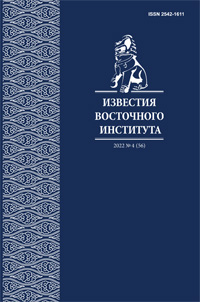The role of family education in the formation of spiritual and moral values in the family of the indigenous peoples of the Lower Amur and Sakhalin: tradition and modernity
DOI:
https://doi.org/10.24866/2542-1611/2022-4/13-26Keywords:
spiritual and moral values, intergenerational transmission, ethnocultural traditions, indigenous peoples, spiritual world, material worldAbstract
In the article, using comparative historical and typological methods, the role of family education in the formation of spiritual and moral values of the youth of the indigenous peoples of the Lower Amur and Sakhalin will be considered; how this process took place in a traditional family, its changes under the influence of various social transformations, and how this process is proceeding today. The presented material allows us to draw the following conclusions: in the Soviet period, due to a number of objective and subjective reasons, the mechanism for transmitting spiritual and moralтрансмиссию values was practically lost. Only at the end of the 20th century, with the growth of national self-consciousness among indigenous ethnic groups, the question of the revival of traditional cultures began to be raised, but at present the task of transferring spiritual and moral values through interaction between generations, to a greater extent, is performed by kindergartens, schools and other public organizations.




